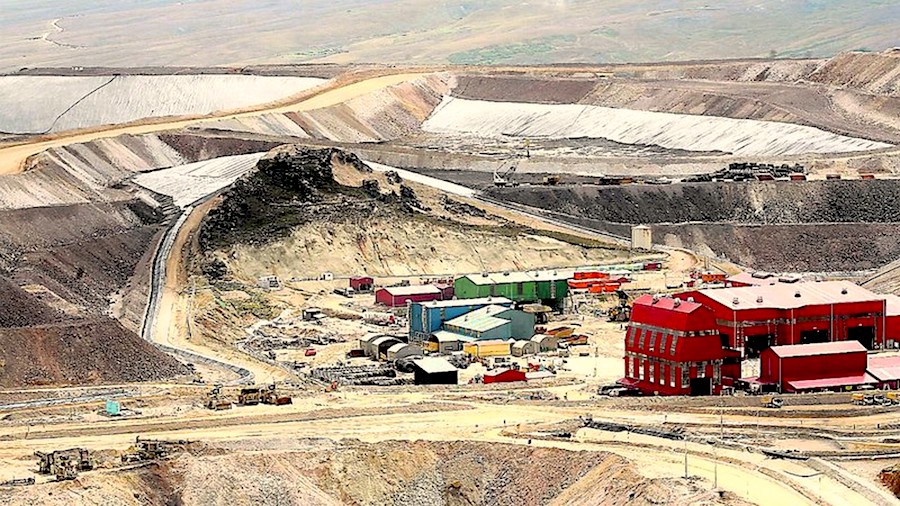Peru’s ability to post eight consecutive months of investment growth is calming fears that political woes would derail mining activity in the world’s second-largest producer of copper, zinc and silver.
Mining investment in Peru jumped 6.3 percent in August compared with last year, to $395 million, according to the latest report by the- Energy and Mines Ministry. Investment in development and preparation, the first stages in building a mine, reached $63 million, the highest in more than four years.
“Peru has a natural geological potential that other countries don’t,” said Ricardo Labo, a former deputy mines minister, in an interview. “But this political noise distracts from change; you can’t have ministers and vice-ministers distracted when they should be focused on vital issues like cutting back permitting.”
Peru has the potential to overtake Chile to become the world’s biggest copper producer, but it’s being held back by a lack of infrastructure and a ten-fold increase in permitting in the last seven years.
Pedro Pablo Kuczynski quit as Peru’s president in March on the eve of an impeachment vote and his successor, Martin Vizcarra, has clashed with Congress as he grapples with one of the country’s biggest corruption scandals. Meanwhile, in the last two years, the country has had four mining ministers and local communities have blocked access to several large copper mines.
Still, mining companies seem to be taking it all in stride: Since June, Anglo American Plc., Minsur SA and Aluminum Corp of China Ltd. have all approved the start of large investments.
“We’re expecting to get at least $21 billion of investments going in the next three years,” Francisco Ismodes, the current energy and mines minister, said in an interview in Lima. “Given the international context, with demand forecast to support metal prices, we’re expecting sustained growth in investment.”
In July, Anglo American approved the $5.3 billion Quellaveco project while Minsur okayed its $1.6 billion Mina Justa mine in September.
These projects are part of a $58.5 billion portfolio of mining investments that could double Peru’s copper output, Ismodes said. Next year, he expects Teck Resources Ltd. to begin developing the $1.2 billion Zafranal copper project and First Quantum Minerals Ltd. to start building its $2.8 billion Haquira mine.
Another project already helping lift investment in the country is Southern Copper Corp.’s expansion of the copper concentrator plant in Toquepala.
Regional polls
All eyes will be on the results of regional and municipal elections across the country on Oct. 7. Governors and mayors have been able to block projects in regions in the past. But now, surveys indicate that fewer candidates are campaigning on an anti-mining platform, according to a BTG Pactual research note.
“Unlike 2010 and 2014, when there were strong anti-mining contenders and winners, in some regions, we do not expect a similar outcome in this election,” said Cesar Perez-Novoa, an analyst at BTG Pactual. “A market-positive outcome from these elections could potentially lead to an upgrade” in Peru’s pipeline.
This could be the case in Cajamarca, in northern Peru, where anti-mining politicians governed for years, blocking projects and resulting in a lack of investment and increasing poverty, Perez-Novoa said. A change in leadership in the region could accelerate stalled projects for Buenaventura and Southern Copper in the region, he added.

In Apurimac, in the south, political leadership will be key to ease tensions around the MMG Ltd-owned Las Bambas copper mine. The largest copper project developed recently in Peru has faced several road blockades from protesting local communities. The last one ended last month only after the government declared a 30-day emergency on 482 kilometers (300 miles) of highway in the Andes mountains and deployed troops to help police restore order.
Peru has the potential to overtake Chile to become the world’s biggest copper producer, but it’s being held back by a lack of infrastructure and a ten-fold increase in permitting in the last seven years, said Juan Luis Kruger, chief executive officer at Minsur. The government can’t change the rules of the game and must make sure that the law applies to everyone, he said at a Sept. 28 event in Lima.
“The main challenges are within the country,” Kruger said. “We can’t have world class assets — billions of dollars in investments– that every day suffer blockades, blackmail and extortion, and that aren’t protected by the law.”





Comments